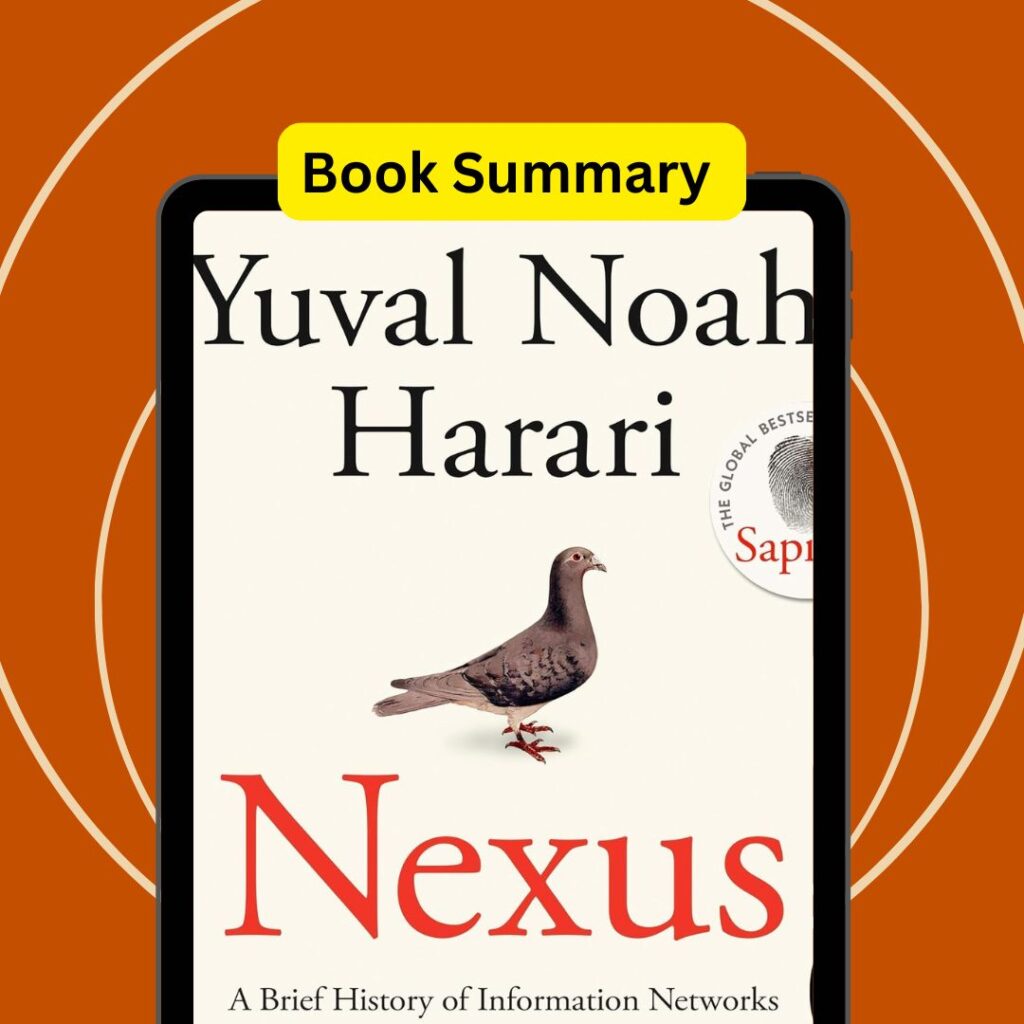Nexus Summary: A Brief History of Information Networks from the Stone Age to AI
Nexus: A Brief History of Information Networks from the Stone Age to AI by Yuval Noah Harari is a thought-provoking exploration of how information networks have shaped human history and continue to influence our future. Set to release on September 10, 2024, this book promises to provide readers with a comprehensive understanding of the evolution of communication and its implications for society. In this blog post, we will delve into a detailed summary of Nexus, examining its key themes, insights, and the critical questions it raises about our interconnected world.

Table of Contents
Yuval Noah Harari: A Brief Biography
Yuval Noah Harari is an Israeli historian and philosopher renowned for his engaging writing style and ability to distill complex ideas into accessible narratives. Born on February 24, 1976, Harari earned his PhD from the University of Oxford and has since become one of the most influential public intellectuals of our time. His previous works, including Sapiens, Homo Deus, and 21 Lessons for the 21st Century, have garnered international acclaim for their insightful analysis of human history and future possibilities.
Historical Context
Nexus begins by tracing the origins of information networks from prehistoric times to the present day. Harari emphasizes that communication has always been a fundamental aspect of human society, allowing individuals to share knowledge, collaborate, and build communities. He discusses how early humans relied on oral traditions before the advent of writing systems, which revolutionized information sharing.
The Evolution of Information Networks
Harari outlines several key milestones in the development of information networks:
- The Invention of Writing: Writing systems enabled humans to record information, leading to the establishment of complex societies and bureaucracies.
- The Printing Press: The invention of the printing press in the 15th century democratized knowledge by making books more accessible, fostering literacy and education.
- Telecommunications: The rise of telegraphy and telephony transformed communication by allowing instant messaging across vast distances.
- The Internet: The advent of the internet revolutionized how people connect, share information, and interact globally.
- Artificial Intelligence: Harari discusses AI’s role in shaping future communication networks, emphasizing its potential to both enhance cooperation and create new challenges.
1. Information as Power
One central theme in Nexus is that information is a source of power. Throughout history, those who controlled information networks—be it through writing, printing, or digital media—held significant influence over societies. Harari warns that as AI systems become more integrated into our lives, they could exacerbate existing inequalities by concentrating power in the hands of a few tech giants.
2. The Duality of Information
Harari explores the dual nature of information—it can be a tool for enlightenment or manipulation. He emphasizes that while information can foster cooperation and understanding, it can also spread misinformation and create division. As we navigate an increasingly complex information landscape, critical thinking becomes essential.
3. The Role of Cooperation
Cooperation has been a driving force behind human progress. Harari argues that large networks built on shared beliefs enable societies to function effectively. However, he cautions that these networks can also perpetuate falsehoods if not grounded in truth.
4. The Impact of Technology on Communication
The book examines how technological advancements have transformed communication methods over time. From written language to digital platforms, each innovation has reshaped how people connect and share ideas. Harari posits that understanding these changes is crucial for navigating contemporary challenges.
5. The Future of Information Networks
In his concluding chapters, Harari speculates on the future trajectory of information networks in an age dominated by AI. He raises important questions about privacy, surveillance, and the potential for technology to manipulate public opinion.
Critical Reception
Early reviews for Nexus have been overwhelmingly positive, with readers praising Harari’s ability to simplify complex historical trends while providing clear insights into contemporary challenges. Influential figures such as Stephen Fry and Mustafa Suleyman commend the book for its timely exploration of humanity’s relationship with information.
FAQs for Nexus Book Summary
What is Nexus about?
Nexus: A Brief History of Information Networks from the Stone Age to AI by Yuval Noah Harari explores the evolution of information networks throughout human history. The book examines how these networks have shaped societies, influenced power dynamics, and impacted human progress, particularly in the context of the current age of artificial intelligence.
Who is the author of Nexus?
The author, Yuval Noah Harari, is an Israeli historian and philosopher known for his bestselling works, including Sapiens and Homo Deus. He is recognized for his ability to weave complex historical narratives with contemporary relevance.
What are the main themes of the book?
Key themes include:
- The Power of Information: How information networks have historically influenced societies and governance.
- Technological Impact: The implications of AI and digital networks on future human interactions and societal structures.
- Truth vs. Fiction: The role of narratives and myths in shaping human behavior and societal norms.
How is the book structured?
Nexus is structured chronologically, tracing the development of information networks from ancient times to the present. It includes historical examples, philosophical insights, and Harari’s reflections on the future of communication and technology.
What can readers expect to learn from this book?
Readers can expect to gain a deeper understanding of how information shapes human history and society. The book prompts reflection on the ethical implications of technology and encourages critical thinking about our current trajectory regarding AI and information dissemination.
Who would benefit from reading this book?
Nexus is suitable for anyone interested in history, technology, philosophy, or social sciences. It appeals to readers who wish to understand the complexities of modern communication and its potential consequences.
Are there any notable insights or quotes from the book?
Yes, Harari provides numerous thought-provoking insights about the relationship between information and power. One significant takeaway is the warning that unchecked technological advancements could lead to a loss of autonomy for individuals in society.
Is Nexus a continuation of Harari’s previous works?
Yes, Nexus builds upon themes explored in Harari’s earlier books but focuses more specifically on the implications of information networks in contemporary society. It serves as a critical examination of how these networks may shape our future.
When was Nexus published?
Nexus is set to be released on September 10, 2024. It promises to be a timely exploration of critical issues facing humanity in an increasingly interconnected world.
Conclusion
Nexus: A Brief History of Information Networks from the Stone Age to AI promises to be a compelling exploration of how our means of communication shape society’s trajectory. Yuval Noah Harari’s insights into the power dynamics surrounding information will resonate with readers seeking to understand their place in an increasingly interconnected world.As we stand at a crossroads where technology continues to evolve rapidly, Nexus serves as a timely reminder that our choices regarding information will significantly impact our collective future. By fostering critical thinking and promoting ethical communication practices, we can navigate this new era with greater awareness and responsibility.
Discover marketing services, interviews & publishing tools at SharingStories.


